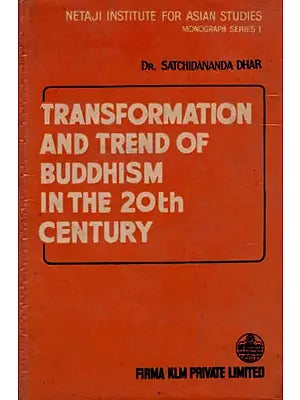Transformation and Trend of Buddhism in the 20th Century By Satchidananda Dhar
Transformation and Trend of Buddhism in the 20th Century By Satchidananda Dhar
Hardcover
Couldn't load pickup availability
Book Description
Preface
With deep respect for Gautama the Buddha, his Dharma, and Sangha, many modern philosophers, such as S. Radhakrishnan, and religious leaders like Swami Vivekananda, argue that Buddhism is not a new religion in India. Swami Vivekananda famously described Buddhism as the fulfillment of Hinduism during his address at the Chicago World’s Parliament of Religions in 1893, attended by many Buddhists and religious delegates. Radhakrishnan stated, "Siddhartha the Buddha was born, grew up, and died as a Hindu." Such perspectives invite scrutiny and require careful consideration to reconcile. Recognizing the Buddha as the culmination of India’s spiritual legacy since the time of the Vedic sages allows us to see Sakyamuni as the ultimate expression of this tradition.
While sharing his teachings with his disciples, the Buddha acknowledged that his doctrine was not new; it resonated with the ancient experiences of Indian sages who had sought to uncover the ultimate truths to address life’s fundamental dilemmas. In his own words, Gautama declared, "O monks, I have discovered an ancient way, an ancient road that was followed by the Perfect Buddhas of old."
Born into a complex Brahmanical milieu, the Buddha aligned with the fundamental metaphysics and ethics of contemporary Vedic thought, which aimed for liberation from the cycle of rebirth. However, he challenged certain prevalent Brahminical practices of his time.
Foreword
In line with its mission to enhance academic awareness about contemporary Asia, the Netaji Institute for Asian Studies has initiated several research projects. The outcomes of these endeavors are intended to be shared as research monographs for broader public access.
Each monograph is guided by the relevant academic discipline of the researcher, yet the findings aim to enrich understanding of various facets of contemporary Asian realities. In studies that draw upon the diverse historical and cultural experiences of societies, it is vital to connect the present with the past and to explore the varied expressions of the present across different cultures. This work on the transformation of Buddhism represents a significant effort to trace the evolving forms of Buddhist teachings and practices in select Asian countries, examining how these have shaped the lifestyles of many people who adhere to Buddhism.
In this context, Buddhism is perceived as a cultural response to the mechanical pursuit of faith through rituals and sacrifices. Its essence is rooted in the promotion of fundamental human values that elevate individuals toward spiritual liberation. This study highlights the important connections between the spiritual experiences of Buddhism and Hinduism in their original forms, while also acknowledging the substantial transformations that the Buddhist spiritual order underwent as it spread across different countries.
Share


